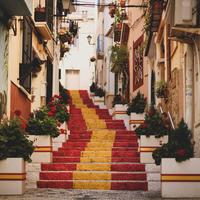Junio
June
Juni
Ιούνιος
June
Juin
六月
6월
Juni
Czerwiec
junho
Haziran
Червень
六月
Junio es el sexto mes del año en el Calendario Gregoriano y tiene 30 días
Juni|||sechste||||||||||
June|||sixth|month|||||Calendar|Gregorian|||
|||szósty||||||||||
Juni ist der sechste Monat des Jahres im Gregorianischen Kalender und hat 30 Tage
June is the sixth month of the year in the Gregorian Calendar and has 30 days
6月はグレゴリオ暦の1年の6か月目で、30日あります。
6 월은 그레고리력에서 한 해의 여섯 번째 달이며 30 일이 있습니다.
El 21 de Junio se produce el solsticio de verano, que da inicio a esta estación.
||Juni||||Sonnenwende||Sommer||gibt|Beginn|||Jahreszeit
||||occurs||solstice||summer||gives|beginning|||season
||||||||||||||季節
||||||solstycjum||||||||pora roku
Am 21. Juni findet die Sommersonnenwende statt, die in dieser Saison beginnt.
On June 21, the summer solstice takes place, which starts this season.
Le 21 juin, le solstice d'été a lieu, qui commence cette saison.
6月21日、今シーズンから始まる夏至が発生します。
6 월 21 일에는 이번 시즌에 시작되는하지가 열립니다.
21 июня наступает летнее солнцестояние, которое начинается в этом сезоне.
La "Verbena de San Juan", también conocida popularmente como la "Noche del Fuego" o la "Noche de las Brujas", es una celebración que se realiza la noche del 23 al 24 de junio.
|Volksfest||||auch||umgangssprachlich|||Nacht||Feuer||||||Hexen|||Feierlichkeit|||||||||
|festival||Saint||also|known|popularly||||of the|Fire|||of the|||Witches|||celebration|||carried out||||||
|Verão|||||||||||||||||||||||||||||
|wianki||||||popularnie|||||ogień||||||czarownice|||celebracja|||||||||
|バーベナ|||||||||||||||||||||||||||||
Die "Verbena de San Juan", auch bekannt als die "Nacht des Feuers" oder die "Nacht der Hexen", ist eine Feier, die in der Nacht vom 23. auf den 24. Juni stattfindet.
The "Verbena de San Juan", also known popularly as the "Night of Fire" or the "Night of the Witches", is a celebration that takes place on the night of June 23 to 24.
La "Verbena de San Juan", également connue sous le nom de "Noche del Fuego" ou "Nuit des sorcières", est une célébration qui a lieu dans la nuit du 23 au 24 juin.
「火の夜」または「魔女の夜」としても知られる「バーベナデサンファン」は、6月23日から24日の夜に行われるお祝いです。
"Noche del Fuego"또는 "마녀의 밤"으로도 널리 알려진 "Verbena de San Juan"은 6 월 23-24 일 밤에 열리는 축하 행사입니다.
«Вербена-де-Сан-Хуан», также известная как «Ночь огня» или «Ночь ведьм», — это праздник, который проходит в ночь с 23 на 24 июня.
Es de origen pagano y antes de la instauración de cristianismo coincidía con el solsticio de verano, el 21 de junio.
||Ursprung|heidnisch||vor|||Einführung||Christentum|zusammenfiel mit|||Sonnenwende||||im|
It||origin|pagan||before|||establishment||Christianity|it coincided|with||solstice||summer|||June
|||pogański|||||instauracji||chrześcijaństwo|pokrywał się|||przesilenie|||||
Es ist heidnischen Ursprungs und vor der Gründung des Christentums fiel es mit der Sommersonnenwende am 21. Juni zusammen.
It is of pagan origin and before the establishment of Christianity coincided with the summer solstice, on June 21.
Il est d'origine païenne et avant l'établissement du christianisme, il a coïncidé avec le solstice d'été, le 21 juin.
それは異教の起源であり、キリスト教が確立される前は、6月21日の夏至と一致していました。
이교도 출신이며 기독교가 수립되기 전에 6 월 21 일에하지와 일치했습니다.
La celebración tiene sus peculiaridades en cada comunidad, pero el fuego es el protagonista en todas ellas.
||||Besonderheiten|||||||||Hauptakteur|||
||has||peculiarities||every|community|but||fire|||protagonist|||them
||||特性||||||||||||
||||cechy szczególne||||||||||||
Die Feier hat ihre Besonderheiten in jeder Gemeinschaft, aber der Protagonist ist das Feuer in allen.
The celebration has its peculiarities in each community, but the protagonist is the fire in all of them.
La célébration a ses particularités dans chaque communauté, mais le protagoniste est le feu dans chacune d'elles.
お祝いには各コミュニティに特徴がありますが、主人公はすべてのコミュニティの火です。
축하 행사는 각 커뮤니티마다 고유 한 특징이 있지만 주인공은 모두 불입니다.
Junto con Julio y Agosto, suelen ser los meses más calurosos del año.
|||||sind|||||heißesten||
Together with||July||August|they tend to|||months|most|hot||
||||||||||najcieplejsze||
Zusammen mit Juli und August sind sie normalerweise die heißesten Monate des Jahres.
Along with July and August, they are usually the hottest months of the year.
Avec juillet et août, ce sont généralement les mois les plus chauds de l'année.
7月と8月に加えて、それらは通常1年で最も暑い月です。
Es poco frecuente que llueva y, cuando lo hace, suelen ser tormentas de verano, es decir, lluvias intensas pero breves.
||häufig||regnet||wenn||regnet|pflegen zu||Gewitter|||||Regenfälle|intensiv||kurzzeitig
It|rarely|frequent||it rains|||||they usually|to be|storms||summer||to say|rainfalls|intense||short
||頻繁||雨が降る||その時|||||||||||||
||||deszcz pada|||||||burze||||to say||intensywne||krótkie
Es ist selten, dass es regnet und wenn es so ist, sind es normalerweise Sommerstürme, das heißt intensive, aber kurze Regenfälle.
It is rare that it rains and, when it does, they are usually summer storms, that is, intense but brief rains.
Il pleut rarement et quand il le fait, ce sont généralement des tempêtes estivales, ce qui signifie des pluies fortes mais brèves.
雨が降ることはめったになく、雨が降った場合、通常は夏の嵐、つまり激しいが短時間の雨です。
비가 거의 내리지 않을 때는 보통 여름 폭풍으로 폭우가오고 짧은 비가 내립니다.

